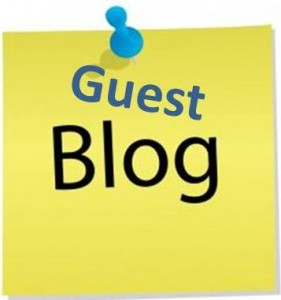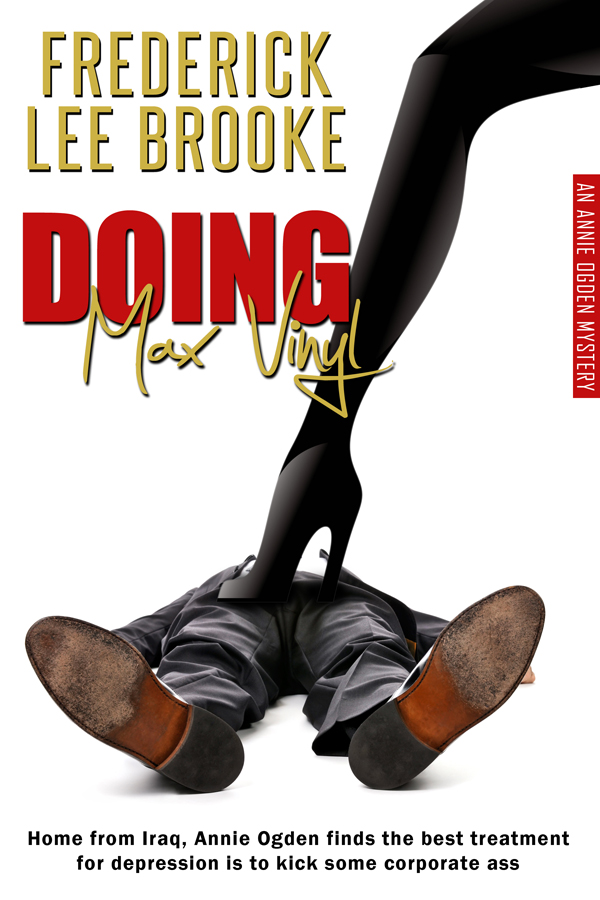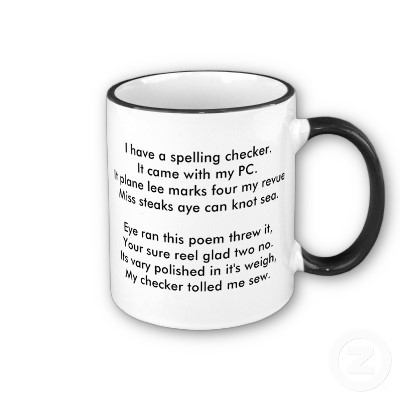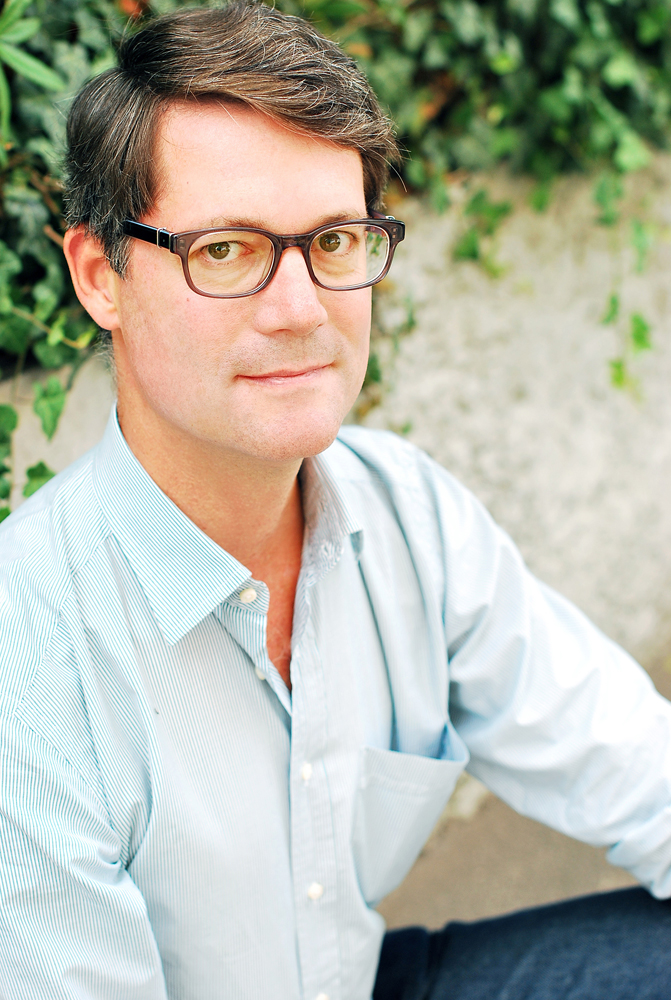 You’re all familiar, I assume, with Twofer Tuesdays? This is when a radio station plays two songs in a row from every artist that day. Well in a way this is a Twofer for me today—I have the honor of hosting another guest blog AND it is also one of my favorite Indie writers around. Frederick Lee Brooke and I met on Twitter last year (he was one of the very first RABMAD participants), but with my busy schedule I didn’t get a chance to read his debut novel, Doing Max Vinyl, until recently. I was blown away. Fred Brooke is one of those rare Indies; I have no doubt he’ll be on the bestseller list one day. Yes, he’s that good.
You’re all familiar, I assume, with Twofer Tuesdays? This is when a radio station plays two songs in a row from every artist that day. Well in a way this is a Twofer for me today—I have the honor of hosting another guest blog AND it is also one of my favorite Indie writers around. Frederick Lee Brooke and I met on Twitter last year (he was one of the very first RABMAD participants), but with my busy schedule I didn’t get a chance to read his debut novel, Doing Max Vinyl, until recently. I was blown away. Fred Brooke is one of those rare Indies; I have no doubt he’ll be on the bestseller list one day. Yes, he’s that good.
And today he’s written a necessary read for any burgeoning author, sharing eight key things he’s learned marketing his first book as an Indie. So grab a cup of whatever warms your insides and makes you feel good, sit back, and learn some tricks of the trade, taught by one of the true up-and-coming Indie success stories!
8 Things I Learned From Writing My First Book
By Frederick Lee Brooke
Are you a budding writer? Fantastic! I can’t imagine anything more exciting than writing books, plumbing the depths of my imagination, playing with this great plastic language of ours, maybe even tossing around a few big ideas once in a while.
Indie writers like you and me and Rob Guthrie face special challenges. We not only  have to write the next great novel, we have to market it ourselves. We have to help the world discover it.
have to write the next great novel, we have to market it ourselves. We have to help the world discover it.
I started writing my first book, Doing Max Vinyl (An Annie Ogden Mystery), in September 2008 and finally uploaded it to Amazon as an ebook in April 2011. My second book will be ready in June 2012.
I started thinking about how to market Doing Max Vinyl about a month before I uploaded it, and from then on it was learning by doing. I did a lot of things that were unnecessary and a waste of time and money in the beginning, but I also took a few steps that turned out to be well-advised. Here are the biggest things I’ve learned, both about writing a book and about marketing as an indie writer.
1. Write for yourself, but don’t ignore the market
There are many who advocate figuring out your market before even starting to write, then writing stories that will sell to the maximum number of people. This may be right for some, but I don’t want to just write in order to sell books. I want to write stuff that has meaning for me. To put it another way, there are some things I don’t want to write about, like for example high school vampires. That stuff sells well, but it’s not my thing.
That being said, once you have figured out what you can and do want to write, then sit down and study similar works that have already been published. Were you planning a 300 thousand-word tome, and other successful authors are all sticking to 90,000 words? Write a three-part series instead. Don’t ignore what the market is telling you.
2. Plan better and save time on major overhauls
Ask any author, there is nothing harder than taking a finished manuscript and throwing away one-third of it because you’ve realized it’s all wrong. I don’t know if this ever happens to Nora Roberts or Danielle Steel. It happened to me with Doing Max Vinyl at least five different times. I had to throw out whole chapters. I forgave myself, that being my first book. I enjoyed the process, too. But time is time. Plan, plan, plan, and plan some more, and if you have planned well, maybe you will save some time at the tail end avoiding major overhauls.
3. Get help (beta readers, editor or proofreader, cover designer, book trailer)
It is something of a myth that great writers labor alone for ten years on their novel, then turn it in and out it comes as a finished book. Until recently, all great writers labored under the loving guidance of great editors. Good agents also served as editors, helping authors get a manuscript into shape for submission. The publishing company took over all the other tasks mentioned above, from proofreading to the interior design of the book to the cover design, as well as the rest of the marketing.
As indie authors, we are out in the cold. We don’t have to go searching for an agent or a publisher anymore, and we can do things entirely on our own schedule. But that lack of editing expertise is a huge risk. The risk is that you will not get the most out of your story.  Paraphrasing the great literary agent Donald Maass, you never really finish a book, since you can always get more story out of it. Obviously an objective, professional editor can give you invaluable help making the most of your masterpiece.
Paraphrasing the great literary agent Donald Maass, you never really finish a book, since you can always get more story out of it. Obviously an objective, professional editor can give you invaluable help making the most of your masterpiece.
At the very least, get yourself beta readers who have the time and the good sense to give you honest, hard-hitting criticism. And be prepared to take it seriously. Also you will need a proofreader. I was critiquing a published indie book a few months ago in which the author kept using “loose” where she should have used “lose” — same problem my friend Rob Guthrie flagged in a recent blog. Her answer? Her spell checker hadn’t caught those. Friend, be advised, there are lots of quirky little things in the English languge the spell checker won’t catch. And Bill Gates is the second richest man on the planet …
4. Don’t underestimate formatting issues
Maybe it’s just me, but I feel like I’m in a full-body cast when it comes to formatting issues. I write my novel in Word. Then I want to upload it to the Kindle platform. Oh, man, think again. Word has indents. Word has other things the Amazon platform doesn’t like. I had my manuscript in a docx document, and then it had to be downgraded to an older version of Word to suit Amazon. Why can’t I just write it and send it in? Nah, that would be too easy.
My solution was to find a formatter. The first one I found was not able to help me, but with a little research, I found an second one who took my manuscript and made one version for the Kindle people and another one for the Smashwords people. I think she charged me less than $50. If you can do it yourself, fine, but if you can’t, help is available. Glad to give you her name if you need it.
5. Join the community of writers online
The great thing about writers is that by and large we are not competitive people. We don’t need to be. The kind of readers we are looking for read anywhere from twenty to one hundred or more books per year.
Most people tend to read one or two or three genres, but not all genres. So we can all comfortably
target the same great mass of readers knowing that there’s a good chance they’ll read both your books and mine.
You’ll find thousands and thousands of other writers on Twitter. Just give it a few months. Organizations like IAN, the Independent Author Network, are there to help. On Facebook you’ll find Celebrating Authors, Helping Authors One Author at a Time, and Kindle Mojo, just to name a few. On Triberr you can join a group of like-minded bloggers and expand your reach.
You’ll find lots and lots of really nice people who understand perfectly what you’re going through, and who give you sympathy and support. Treat them with respect and read their books, and you’ll soon find them doing the same. Naturally you can learn a lot from writers who have been through all this stuff before you, too. With technology and everything changing so fast, it’s helpful to have sources of information at your fingertips.
6. Invest in small, inexpensive online promotions
I can’t believe I was actually buying magazine ads at this time last year. They cost a mint.
I don’t think my magazine ads resulted in a single download of Doing Max Vinyl. What really works are things like Pixel of Ink’s book of the day promotion for $169. It’s a lot of money, but less than a magazine ad, and you’ll get a lot of downloads. Right now I’m doing a four-day promotion with Week in Rewind. March 15 – 18 my book is featured on the Win With eBooks buy-one-get-one-free March promotion, and my book is also listed on the IAN March Madness page. In April I’ll have something on Kindle Daily Nation.
You are limited only by your own creativity. Combining your personal blog with internet promotions and collaboration with other writers is sure to get you some needed exposure, and a few sales beyond friends and family.
7. Join Goodreads and have conversations with writers and readers
Goodreads is a fantastic website for many reasons. As a writer, you undoubtedly love books. Goodreads helps you keep up with new books that are coming out, books by authors you’ve never heard of. You can also create order among your own collections of books, making your own custom-named shelves like “read in 2011”, “to read in 2012”, “books I gave up on”, or whatever.
As an author, you can organize giveaways of your book. You can get your book on a list, and if people vote for it move your book up the list. Doing Max Vinyl is 1 on the Goodreads list Best Mysteries/Thrillers/Suspense Novels of 2011, see it here.
But the best part of Goodreads, I find, is conversations with readers and other authors. There are chat groups on every conceivable subject, and there is direct messaging. There’s nothing like getting in a room with like-minded people. Imagine a block party with nine million other readers. Welcome to Goodreads.
8. Help others market their books and then let them help you
When I started on Twitter, I sent out a lot of tweets that basically said, in one form or another, “Buy my book!” Just follow twenty authors and you’ll see a lot of this. I discovered over many months that this did not lead to book sales. It’s a fact. It just turns people off.
![]() Turn that strategy on its head. Promote your friends’ books instead. Compose a tweet with a link to their blog or Amazon page. Use Hootsuite or another provider to schedule tweets for your friends that go out ever two or three days at different times. Your friends will be grateful. It will be a natural step for them to support you in similar or other ways. The benefit of this is that if your friend tweets to promote your book, his tweet goes to his or her followers, a whole new set of people who don’t know you so well. Multiply by this by the number of people you’re promoting.
Turn that strategy on its head. Promote your friends’ books instead. Compose a tweet with a link to their blog or Amazon page. Use Hootsuite or another provider to schedule tweets for your friends that go out ever two or three days at different times. Your friends will be grateful. It will be a natural step for them to support you in similar or other ways. The benefit of this is that if your friend tweets to promote your book, his tweet goes to his or her followers, a whole new set of people who don’t know you so well. Multiply by this by the number of people you’re promoting.
Not only on Twitter is it possible to help your friends. Organize a promotion in which ten or twenty authors can all feature their book covers. The promotion takes place on twenty different blogs instead of just on yours. Twenty different authors are promoting it on Twitter and Facebook and Google+. Everyone chips in $5 or $10, and some nice prizes can be awarded. Everybody wins.
What about you?
What did you learn writing your first book and learning to market it? I’m sure you have an interesting story too. I’d like to hear it in your comments.






Thanks so much for hosting my long-winded post, Rob!!
I’m tagging you! I have 11 questions I’d like to read the answers to. (congrats on Dark Prairie, by the way)
http://scottswrittenwords.blogspot.com/
Great stuff, Frederick and Rob!
What would you guys say about covers? I’m fascinated by Joel Friedlander’s monthly reviews of covers, the latest at http://www.thebookdesigner.com/2012/03/e-book-cover-design-awards-february-2012/
Paul, thanks for your comment. Covers, that’s another whole ball game, isn’t it? Only thing I would say is it’s something I’d leave to a professional.
Fred – outstanding post my friend.
Rob – having Frederick guest might have made up for having me 🙂
You two are the best – the very best.
Great post, Fred. I’m slightly behind you on the marketing curve, but everything you’ve said here resonates with my own experience so far. It does take a huge amount of time, of course. But nobody said that this was going to be easy, right?
Thanks for an excellent group of comments and suggestions. I’m on Goodreads but haven’t made good enough use of it yet.
Monti
Mary Montague Sikes
An absolutely terrific post, and thank you for passing it on. Another useful reference source on developing social network platforms (for those just starting out and feeling overwhelmed by the marketing aspects), is Kristen Lamb’s “We are Not Alone”. Cheers, Lyn.
Excellent article for Indie publishers! As an Indie writer myself, I especially liked the section on where Indie writers can get support from other writers. Thanks for the info!
Fred thank you for excellent insights on things that work. I look forward to reading Doing Max Vinyl